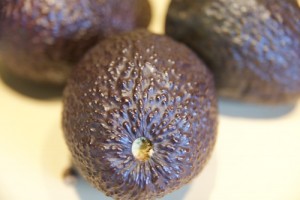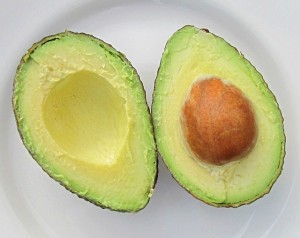Identify when it’s ripen
P inch the tops and bottoms and when they yield to pressure on both ends they are ripe.
inch the tops and bottoms and when they yield to pressure on both ends they are ripe.Make the avocado ripeness test: remove the stem, if it’s green inside then it’s underripe; if it’s dark brown then it’s overripe; if it’s yellowish then it’s just right. Watch here the avocado ripeness test.
Source of proteins
Avocados provide all of the essential amino acids (those that must be provided by our diet), with 18 amino acids in all. Avocados contain more protein than cow’s milk, about 2% per edible portion.The fuel required to digest avocado is less than half of that required to digest meats, and digestion time is dramatically lower as well. (1)
They don’t run the risk of contamination with parasites or pathogens, as meat, fish, eggs and milk may suppose. They are not treated with chemicals, antibiotics and hormones, they are classified between the “clean 15” foods with the lowest pesticide load. (7)
Unlike nuts, avocados don’t have anti-nutrients that may counter the good nutrients.
Source of fats
The fat content (by weight) varies from 7 to 26% according to the variety, averaging 15%. Approximately 63% of the fat in avocados is monounsaturated, 20% is polyunsaturated and 17% is saturated. So the majority of fat is oleic acid, which has been linked to reduced inflammation.The fat they provide is more digestable than animal fats.
Avocados are the perfect source of dietary fat, appetizing in their raw state, digestible, and pure. (1)
Source of minerals, vitamins, fiber, water
Avocados are busting in nutrients: vitamins A, B-complex, C, E, H, K, and folic acid, plus the minerals magnesium, copper, iron, calcium, potassium, and many other trace elements.The water content of avocado by weight averages 74%. (1)
They also contain lutein and beta-carotene. (4)
The fiber ccontent of avocado is 7%, which is very high compared to most other foods. 25% of this fiber is soluble and 75% insoluble. Soluble fiber is said to feed the friendly gut bacteria in the intestine.
But the total amount of nutrients is not the only thing that matters. We also need to be able to absorb them. Some vitamins , such as A, D, E and K, are fat soluble, so they need to be combined with fat in order to be utilized. So avocado contains the perfect combination of fat and vitamins. (5)
One study showed that adding avocado to a salad can increase antioxidant absorption by 2.6 to 15 fold (2)
Alkalinizimg
Avocado is an alkalinizing food, i.e., the mineral end products of metabolism have an alkalinizing effect in the blood and other bodily fluids. Because the human body works to maintain a slightly alkaline pH, an alkalinizing diet is the most healthful way of eating. Meat, dairy and most raw nuts create acidity in the body, and excess eating of these causes the leaching of calcium from our bones to buffer the acidity, leading to osteoporosis. (1)Dr. Douglas Graham states: “Current bone density testing has verified loss of calcium from the bones after the consumption of just one meat meal. A similar meal containing the same amount of protein from plants results in no calcium loss.” (3)
Benefits
All these high nutritional values confer avocado the following benefits: (4)- Healthy for the heart
- Great for vision
- Osteoporosis prevention
- Help prevent cancer
- Prevent constipation
- Natural detoxification
- Help lose weight
- Good for skin
- Anti-inflammatory
How to eat it
 For optimum digestion, eat avocado alone or with any non-sweet-non-starchy fruit or any non-starchy vegetable food. Eating avocado with leafy greens, celery and/or cucumber will enhance the digestive process as additional digestive enzymes are secreted.
For optimum digestion, eat avocado alone or with any non-sweet-non-starchy fruit or any non-starchy vegetable food. Eating avocado with leafy greens, celery and/or cucumber will enhance the digestive process as additional digestive enzymes are secreted. Don’t eat avocado with any other kind of oily, fatty or high-protein food such as seeds, nuts, coconut, olives, yogurt, cream, cheese or meat.
The quantity of avocados that is healthful for you is a function of your taste preferences and digestion. Generally, one a day, three to six days per week is a good baseline. For best results, tune in to your body’s senses and observe your energy levels, digestion and elimination. (1)
Allergies and intolerances
Avocados are native to Mexico and Central America, so europeans are not very used to this kind of food, although now it’s cultivated also in some Mediterranian countries such as Spain. At the beginning of introducing this food, some intolerances or allergies may appear.It’s possible to have allergy or intolerance to avocado, mainly people with latex allergies. Symptoms include a stuffy nose, wheezing, coughing and edema. (6)
Avocados are very high in histamine, so better avoid it if you have histamine intolerance. It’s a medium salicylate content food, so be careful if you follow a low salicylate diet such as Feingold diet.
On the other side, avocado is low in fructose, so it will be a good fruit if you have fructose intolerance.
Overeating avocados can lead to sluggishness, hyper-acid stomach, and skin outbreaks. (1)
Enjoy your avocado with a salad making a delicious guacamole!
Bibliography
(1) “The Vibrant Diet ”, Dr. T.C.Fry & Dr. David Klein
(2) “Carotenoid Absorption from Salad and Salsa by Humans is Enhanced by the Addition of Avocado or Avocado Oil”, http://jn.nutrition.org/content/135/3/431.full
(3) “The 80/10/10 Diet”, Dr. Douglas N. Graham
(4) “Avocados: Health Benefits, Nutritional Information”, http://www.medicalnewstoday.com/articles/270406.php
(5) “12 Proven Benefits of Avocado”, http://authoritynutrition.com/12-proven-benefits-of-avocado/
(6) “Latex allergy”, Mayo Clinic, http://www.mayoclinic.org/diseases-conditions/latex-allergy/basics/risk-factors/con-20024233
(7) “Clean fifteen”, http://www.ewg.org/foodnews/
 The avocado is a unique fruit because of its high fat content and low sugar levels. It has a high nutritional value, and is very much appreciated by vegetarians due to its high content of high quality protein and fat, in addition to vitamins, minerals and fiber.
The avocado is a unique fruit because of its high fat content and low sugar levels. It has a high nutritional value, and is very much appreciated by vegetarians due to its high content of high quality protein and fat, in addition to vitamins, minerals and fiber.











